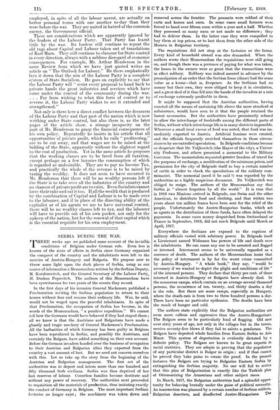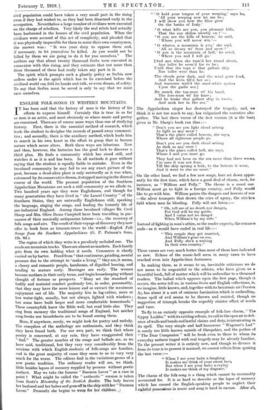SERBIA DURING THE WAR.
THREE weeks ago we published some account of the invisible conditions of Belgium under German rule. Even less is known of the state of affairs in Serbia since Germany organized the conquest of the country and the inhabitants were left to the mercies of Austria-Hungary and Bulgaria. We propose now to throw some light upon the dark places of Serbia, using as our source of information a Memorandum written by the Serbian Deputy, M. Katslerovitch, and the General Secretary of the Labour Party, M. Dusban Popovitch. The authors of this Memorandum have been eyewitnesses for two years of the events they record.
In the first days of his invasion General Mackensen published a Proclamation inviting the Serbian population to return to their homes without fear and resume their ordinary life. War, he said, would not be waged upon the peaceful inhabitants. In spite of that Proclamation, the occupation of Serbia has become, in the words of the Memorandum, " a punitive expedition." We cannot tell how the Germans would have behaved if they had stayed there ; all we know is that the Austrians and Bulgarians have made a ghastly and tragic mockery of General Mackensen's Proclamation. All the barbarities of which Germany has been guilty in Belgium have been reproduced in Serbia, and possibly the Austrians, and certainly the Bulgars, have added something on their own account. Before the German invaders handed over the business of occupation to their Austrian and Bulgarian allies they exported from the country a vast amount of loot. But we need not concern ourselves with this. Let us take up the story from the beginning of the Austrian and Bulgarian management. The first act of the authorities was to deport and intern more than one hundred and fifty thousand Serb civilians. Serbia was thus deprived of her last reserves of labour. Countless families became destitute and without any power of recovery. The authorities next proceeded to requisition all the materials of production, thus imitating exactly the conduct of Germany in Belgium. The most important Serbian factories no longer exist ; the machinery was taken down and
removed across the frontier. The peasants were robbed of their carts and horses and oxen. In some cases small farmers were forced to hand over fifteen oxen within a year and a half. Whether they possessed so many oxen or not made no difference ; they had to deliver them. In the latter case they were compelled to buy them at top prices, or to loot them from the other side of the Morava in Bulgarian territory.
The requisitions did not stop at the factories or the farms. Every kind of household utensil was also demanded. When the authors wrote their Memorandum the requisitions were still going on, and though there was a pretence of paying for what was taken, the losses to the owners were so great that the transactions were in effect robbery. Robbery was indeed assured in advance by the promulgation of an order that the Serbian franc (dinar) had the same value as a krone—that is, fivepence. As the Serbians had no money but their own, they were obliged to keep it in circulation, and a great deal of it thus fell into the hands of the invaders at a rate of exchange extremely profitable to them.
It might be supposed that the Austrian authorities, having exacted all the means of sustaining life above the mere standard of subsistence, would have seen to it that the people retained the barest necessaries. But the authorities have persistently refused to allow the interchange of foodstuffs among the different parts of Serbia, without which interchange life is in many districts impossible.
Wherever a small local excess of food was noted, that food was im- mediately exported to Austria. Artificial famines were created, and the officials frequently enriched themselves in these circum- stances by uncontrolled speculation. In Belgrade conditions became so desperate that Dr. Veljkovitch (the Mayor of the city), a Univer- sity Professor, and others presented a memorial to the Military Governor. The memorialists requested greater freedom of travel for the purposes of exchange, a modification of the minimum prices, and permission for the city of Belgrade itself to buy a certain number of cattle in order to check the speculations of the military com- missariat. The memorial (need it be said ?) was regarded by the authorities as a highly suspicious document. Dr. Veljkovitch was obliged to resign. The authors of the Memorandum say that Serbia js " almost forgotten by all the world." It is true that in 1916 two Missions arrived in Belgrade, one Swiss and the other American, to distribute food and clothing, and that within two years about ten million francs have been sent for the relief of the people. Unfortunately the Austro-Hungarian banks, which act as agents in the distribution of these funds, have often delayed the payments. In some cases money despatched from Switzerland or France in September, 1916, did not reach Belgrade until March or April, 1917.
Everywhere the Serbians are exposed to the caprices of military officials vested with arbitrary power. In Belgrade itself a Lieutenant named Widmann has powers of life and death over the inhabitants. He can cause any one to be arrested and flogged or interned. Internment seems to be universally regarded as a sentence of death. The authors of the Memorandum insist that the policy of internment is by far the worst crime committed by Austria-Hungary. " A whole book," they say, " would be necessary if we wanted to depict the plight and conditions of life " of the interned persons. They declare that thirty per cent. of those interned in Austria-Hungary or Bulgaria have already died. In the numerous camps, which contain on an average several thousand
persons, the occurrence of ten, twenty, and thirty 'deaths a day is the rule. But there are some camps, especially in Hungary,
where the death-rate is from two to three hundred persons a day. There have been no particular epidemics. The deaths have been the result of hunger and cold.
The authors state explicitly that the Bulgarian authorities are even more callous and oppressive than the Austro-Hungarians.
The Bulgars seem to be particularly fond of flogging. Old men over sixty years of age, not only in the villages but in the towns, receive seventy-five blows if they fail to salute a gendarme. The Bulgars have deported whole families from Eastern Serbia to Asia Minor. This system of deportation is evidently dictated by a definite policy. The Bulgars are known to be great experts in racial statistics. They are adepts in proving that the population of any particular district is Bulgar in origin ; and if that cannot be proved they "take pains to create the proof. In the present
instance the Bulgars are trying to Bulgarize Eastern Serbia by extinguishing the Serbian majority. No one will fail to notice that this plan of Bulgarization is exactly like the Turkish plan of Ottomanizing the Armenians and other subject races. In March, 1917, the Bulgarian authorities had a splendid oppor- tunity for behaving brutally under the guise of political necessity. An insurrection was planned by a certain number of Serbian soldiers, Bulgarian deserters, and disaffected Austro-Hungarian& Th.
civil population could have taken a very small part in the rising even if they had wished to, as they had been disarmed early in the occupation. Nevertheless a large number of civilians were executed on the charge of rebellion. Very likely the real rebels had actually been harboured in the houses of the civil population. When the civilians were accused of this act of complicity, and pleaded that it was physically impossible for them to resist their own countrymen, the answer was : " It was your duty to oppose them and, if necessary, to let yourselves be killed. As you would not be killed by them we are going to do it for you ourselves." The authors say that about twenty thousand Serbs were executed in connexion with this rising, and they estimate that not more than three thousand of these had really taken any part in it.
The spirit which prompts such a ghastly policy as Serbia now suffers under is the spirit which has to be exorcised before the civilized world can fold its hands and talk, or even dream, of safety. To say that Serbia must be saved is only to say that we must save ourselves.



































 Previous page
Previous page